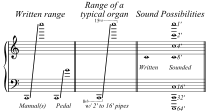Organ player

|
|
| Classification | Keyboard instrument (Aerophone) |
|---|---|
| Playing range | |
| Related instruments | |
| see Keyboard instrument | |
| Musicians | |
| see List of organists | |
| Builders | |
| see List of pipe organ builders and Category:Organ builders | |
| More articles | |
In music, the organ (from Greek ὄργανον organon, "organ, instrument, tool") is a keyboard instrument of one or more pipe divisions, each played with its own keyboard, played either with the hands on a keyboard or with the feet using pedals. The organ is a relatively old musical instrument, dating from the time of Ctesibius of Alexandria (285–222 BC), who invented the water organ. It was played throughout the Ancient Greek and Ancient Roman world, particularly during races and games. During the early medieval period it spread from the Byzantine Empire, where it continued to be used in secular (non-religious) and imperial court music, to Western Europe, where it gradually assumed a prominent place in the liturgy of the Catholic Church. Subsequently it re-emerged as a secular and recital instrument in the Classical music tradition.
Pipe organs use wind moving through pipes to produce sounds. Since the 16th century, pipe organs have used various materials for pipes, which can vary widely in timbre and volume. The pipes are divided into ranks and controlled by the use of hand stops and combination pistons. Although the keyboard is not expressive as on a piano and does not affect dynamics (it is binary; pressing a key only turns the sound on or off), some divisions may be enclosed in a swell box, allowing the dynamics to be controlled by shutters. Some organs are totally enclosed, meaning that all the divisions can be controlled by one set of shutters. Some special registers with free reed pipes are expressive. These instruments vary greatly in size, ranging from a cubic yard to a height reaching five floors, and are built in churches, synagogues, concert halls, and homes. Small organs are called "positive" (easily placed in different locations) or "portative" (small enough to carry while playing). Increasingly hybrid organs are appearing in which pipes are augmented with electronic additions. Great economies of space and cost are possible especially when the lowest (and largest) of the pipes can be replaced.
...
Wikipedia

